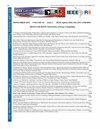Optimal Integration of EV Charging Stations and Capacitors for Net Present Value Maximization in Distribution Network
IF 1.3
4区 工程技术
Q3 COMPUTER SCIENCE, INFORMATION SYSTEMS
引用次数: 0
Abstract
The widespread adoption of electric vehicles (EVs) is crucial for reducing greenhouse gas emissions from traditional vehicles. Central to this adoption is the strategic deployment of electric vehicle charging stations (EVCS), whose improper positioning can pose challenges to electrical networks and utility operators. This paper introduces a novel hybrid approach for optimizing the placement of EVCS and capacitors (CAP) in the distribution network (DN) to mitigate active power loss (APL) and enhance operational efficiency. The methodology includes the optimal placement of CAP banks and EVCS across the network, which is evaluated using the Net Present Value (NPV) criterion. Additionally, the study comprehensively considers the integration of vehicle-to-grid (V2G) capabilities, enhancing network reliability. The proposed hybrid algorithm combines the genetic algorithm (GA) and particle swarm optimization (PSO), i.e., HGAPSO, which leverages their respective strengths in exploration and exploitation. A comprehensive sensitivity analysis is conducted for the IEEE 33, 69, 85, 118, and Brazil 136- bus systems, focusing on cost variables such as energy prices, maintenance costs, and system parameters. This analysis further validates the robustness of the proposed approach, demonstrating significant reductions in APL and maximization of net profit. Comparative results verify the superiority of the hybrid approach over conventional GA and PSO in optimizing the locations of charging stations and reactive power sources within networks.配电网净现值最大化的电动汽车充电站与电容器优化集成
电动汽车的广泛采用对于减少传统汽车的温室气体排放至关重要。采用电动汽车充电站(EVCS)的核心是战略部署,其不适当的定位可能给电网和公用事业运营商带来挑战。本文介绍了一种优化配电网络(DN)中EVCS和电容器(CAP)布局的新型混合方法,以降低有功功率损耗(APL)并提高运行效率。该方法包括CAP银行和EVCS在整个网络中的最佳位置,使用净现值(NPV)标准进行评估。此外,该研究全面考虑了车辆到电网(V2G)能力的集成,提高了网络的可靠性。该混合算法将遗传算法(GA)和粒子群算法(PSO)(即HGAPSO)相结合,发挥各自在探索和开发方面的优势。对IEEE 33、69、85、118和巴西136总线系统进行了全面的敏感性分析,重点关注能源价格、维护成本和系统参数等成本变量。这一分析进一步验证了所提出方法的稳健性,证明了APL的显著降低和净利润的最大化。对比结果验证了该混合方法在优化网络内充电站和无功电源位置方面优于传统遗传算法和粒子群算法。
本文章由计算机程序翻译,如有差异,请以英文原文为准。
求助全文
约1分钟内获得全文
求助全文
来源期刊

IEEE Latin America Transactions
COMPUTER SCIENCE, INFORMATION SYSTEMS-ENGINEERING, ELECTRICAL & ELECTRONIC
CiteScore
3.50
自引率
7.70%
发文量
192
审稿时长
3-8 weeks
期刊介绍:
IEEE Latin America Transactions (IEEE LATAM) is an interdisciplinary journal focused on the dissemination of original and quality research papers / review articles in Spanish and Portuguese of emerging topics in three main areas: Computing, Electric Energy and Electronics. Some of the sub-areas of the journal are, but not limited to: Automatic control, communications, instrumentation, artificial intelligence, power and industrial electronics, fault diagnosis and detection, transportation electrification, internet of things, electrical machines, circuits and systems, biomedicine and biomedical / haptic applications, secure communications, robotics, sensors and actuators, computer networks, smart grids, among others.
 求助内容:
求助内容: 应助结果提醒方式:
应助结果提醒方式:


